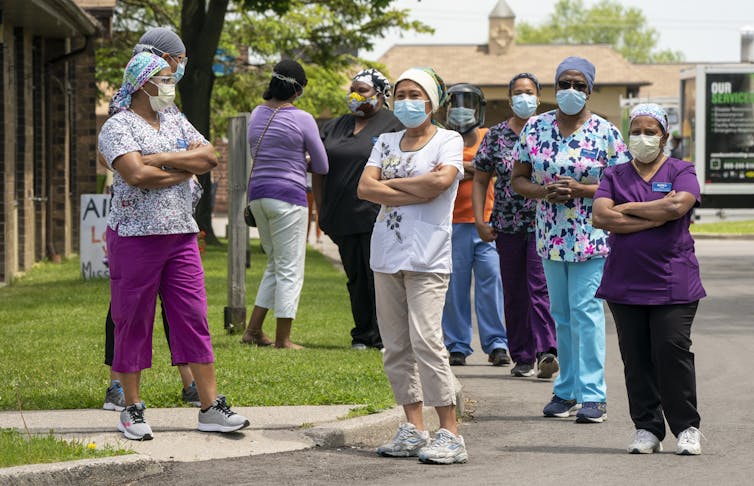
USA & CANADA (901)
Latest News
Iraq 20 years on: researchers assess how US invasion shapes lives today – podcast
Friday, 17 March 2023 23:57 Written by theconversation 
Mend Mariwany and Nehal El-Hadi, The Conversation
On March 19, 2003, the United States led an unlawful invasion into Iraq — at the time, the reason given was the search for weapons of mass destruction. The U.S. occupation of Iraq lasted over eight years, until the official withdrawal of troops throughout 2011.
While the number of deaths as a result of the U.S.-led occupation of Iraq has been difficult to accurately calculate, it is estimated that around 405,000 deaths occurred as a direct result. Most of these deaths were of Iraqi civilians. Hundreds of thousands of others were injured, and over nine million displaced.
Initially, this was due to the U.S. invasion, then as a result of continued conflict due to the sectarian violence that followed between 2006 and 2010, and finally because of the Islamic State group’s occupation in parts of the country from 2013-17.
In this episode of The Conversation Weekly, we speak to two researchers who examine the impact the invasion and conflict have had on the lives of Iraqis.
Sana Murrani Associate Professor in Spatial Practice and Deputy Director for the Doctoral College for the Arts, Humanities and Business at the University of Plymouth, United Kingdom. Originally from Baghdad, Murrani fled Iraq shortly after the 2003 U.S.-led invasion. As part of her research, she has focused on how people cope with the traumatic effects of war.

“Iraqis wake up to a very different landscape every single day,” she points out. “And they engaged with that landscape to have to go to work, to school.”
Murrani interviewed 15 people across Iraq about their lives since the U.S. invasion. These collected narratives will be published in a forthcoming book and featured (Bloomsbury, 2024) in an upcoming exhibition. Ruptured Domesticity: A visual narrative of domestic responses to war in Iraq will be on display at the London School of Economics in the U.K.
For the exhibition, Murrani created collages and maps to visualize the stories of the people she interviewed, which will also be accessible virtually.
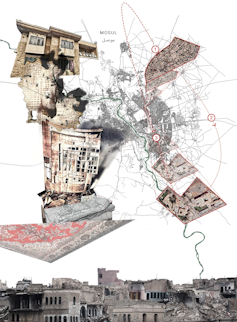
“I think these stories and memories and traumas that have certainly only appeared for a very brief moment under the spotlight,” Murrani explains. “And I’m thinking that this will bring back a focus on Iraq for a bit, for people to understand what has become of a country after 20 years of invasion and traumas.”
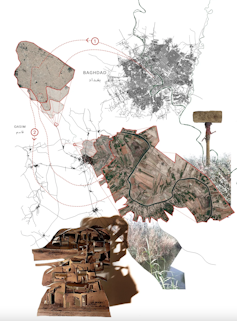
Inna Rudolf is a senior research fellow at the International Centre for the Study of Radicalisation and a postdoctoral research fellow at the Centre for the Study of Divided Societies, King’s College London in the U.K. As part of her research, Rudolf has conducted interviews with Iraqis to understand how contested narratives surrounding decades of conflict have impacted the memory of various communities and their identities.
“What we found out that in order for projects to contribute to social and psychological healing, they need to bring individuals together, and to create a context in which these individuals can perceive each other as humans again. Iraqis from different communities need to recognise that they were all affected by the violence and that each group carries its own scars, which need time and conditions to heal.”
Rudolf says that once the people recognize each other’s pain, Iraqis can begin to heal their communities and their country.
“Each community wants its own victimhood to be heard, understood and acknowledged. And the more they feel that they are pushed into one category, or that their own suffering is not being taken seriously either by their counterparts, by their co-nationals or by the Iraqi government, the more feelings of alienation are likely to prevail over feelings of belonging to the state as equal citizens.”
Many Iraqis want to be able to move on in order to contribute in meaningful ways to their society and actively shape their future, as Rudolf found out.
Listen to the full episode of The Conversation Weekly to find out more.
This episode of The Conversation Weekly was produced and written by Mend Mariwany, who is also the show’s executive producer. Sound design is by Eloise Stevens, and our theme music is by Neeta Sarl.
You can find us on Twitter @TC_Audio, on Instagram at theconversationdotcom or This email address is being protected from spambots. You need JavaScript enabled to view it.. You can also subscribe The Conversation’s free daily email here.
Listen to “The Conversation Weekly” via any of the apps listed above, download it directly via our RSS feed or find out how else to listen here.![]()
Mend Mariwany, Producer, The Conversation Weekly and Nehal El-Hadi, Science + Technology Editor & Co-Host of The Conversation Weekly Podcast, The Conversation
This article is republished from The Conversation under a Creative Commons license. Read the original article.
Famous US lawyer Alex Murdaugh found guilty of murdering wife and son
Monday, 06 March 2023 02:28 Written by lindaikejiblog
A popular South Carolina, USA lawyer
Richard "Alex" Murdaugh has been found guilty of killing his wife and son.
A jury on Thursday, March 2 convicted the once-influential attorney of murder in a case that has gripped America's attention for nearly two years.
The 12-person jury declared Murdaugh, 54, guilty on two counts of murdering his wife Maggie, 52, and youngest son, Paul, 22, who were executed at close range near the dog kennels on their family estate on the evening of June 7, 2021. He was also convicted of two related firearms charges.

Murdaugh showed no emotion as the jury foreperson read the verdict, which the panel reached after three hours of deliberations. He was then led out of the courtroom with his hands cuffed.
His lawyer immediately motioned for a mistrial, which the judge swiftly denied.

"The evidence of guilt is overwhelming," South Carolina Circuit Court Judge Clifton Newman said.
Murdaugh, the whose family eas an influential legal family, had pleaded not guilty, though he admitted to lying about his alibi and to committing to an array of financial crimes in confessions that dented his credibility with the jury.
With the guilty verdict, Murdaugh faces 30 years to life in prison for each of the two counts of murder when he is sentenced on Friday.
The case has drawn intense media coverage given the family's immense political power in and around Colleton County, where the trial took place. For decades until 2006, family members served as the leading prosecutor in the area, and Murdaugh was a prominent personal injury attorney in the Deep South state.
Throughout the trial, prosecutors portrayed Murdaugh as a serial liar and argued that only he had the means and the opportunity to commit the murders. Prosecutors said he gunned down his wife and son to distract from his financial crimes, including the theft of millions of dollars from his law partners and clients - money used to feed a years-long addiction to opioids and support an expensive lifestyle.
Among the state's strongest evidence against the disgraced lawyer was Murdaugh's admission from the stand last week that he lied about his whereabouts on the night of the killings, telling investigators he wasn't at the dog kennels before the murders. Murdaugh changed his account after the jury listened to audio evidence placing him at the crime scene minutes before the killings occurred.
"It doesn't matter who your family is, it doesn't matter how much money you have," Creighton Waters, the lead prosecutor, said after the verdict. "If you do wrong, if you break the law, if you murder, then justice will be done in South Carolina."
Murdaugh's lawyers tried to paint their client as a loving family man who, while facing financial difficulties and suffering from an opioid addiction that led him to lie and steal, would never harm his wife and child.
They floated alternative theories, with Murdaugh testifying that he believed someone angry over a deadly 2019 boating accident involving Paul likely sought revenge on his son.
Jim Griffin, one of the defense lawyers, described the state's alleged motive as preposterous during his closing argument on Thursday, arguing the murders would have only drawn more scrutiny to Murdaugh's financial misdeeds.
Griffin also accused investigators of fabricating evidence and repeatedly stressed that the state must prove guilt beyond a reasonable doubt, underscoring the challenge facing prosecutors who built their case largely on circumstantial rather than direct evidence.
Despite the strong defense, jurors did not believe Murdaugh's account. Prosecutors focused on Murdaugh's credibility, coming back time and again to his admission that he lied about something as critical as where he was when his wife and child were killed.
Judge Newman told jurors they made the right call.
"Circumstantial evidence, direct evidence -- all of the evidence pointed to only one conclusion, and that’s the conclusion that you all reached," he said.
Working more and making less: Canada needs to protect immigrant women care workers as they age
Monday, 06 March 2023 01:52 Written by theconversation
Naomi Lightman, Toronto Metropolitan University and Hamid Akbary, University of Calgary
The pandemic has heightened Canadians’ awareness of the 3D jobs — dirty, difficult and dangerous — done by many migrant workers in our communities.
When the pandemic first struck, many of these workers were on the front line working in essential services. Engaged in low-wage work in health and child care, immigrant care workers had high rates of COVID-19 infections, while also experiencing widespread job losses and continuing financial struggles to make ends meet.
Our recent paper in the Journal of Aging and Social Policy reveals troubling realities for immigrant women care workers as they age. We found that immigrant women aged 65 and over who entered Canada through the (Live-in) Caregiver program work more but make less than other comparable immigrant women. The required live-in component was removed in 2014 and the program has since been split into two pilot programs.
These findings are crucially important given Canada’s rapidly aging population and increasing concern about senior poverty in racialized communities.
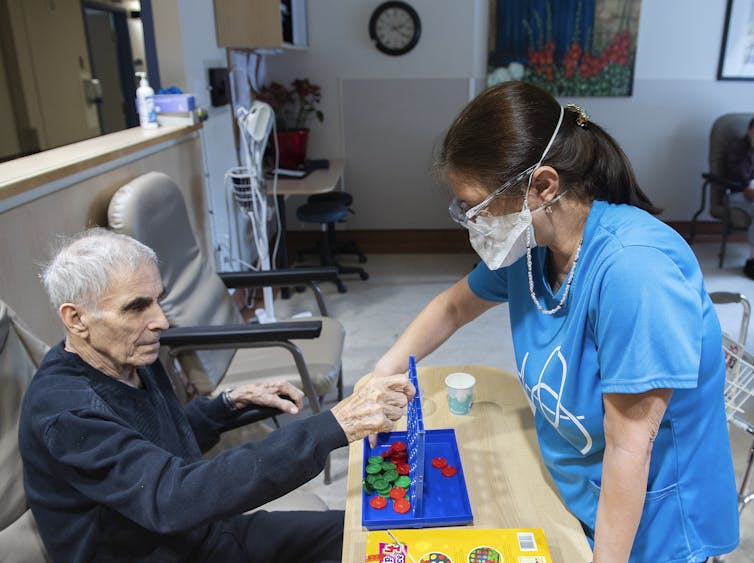
Working past retirement age
In Canada, we have long known that it is disproportionately racialized immigrant women (specifically Black and Filipina women) who do challenging and devalued work as carers. We also know that jobs like personal support workers, home health aides and child-care workers are still usually associated with “women’s work” and tend to have low wages.
However, what we have not known is whether these women continue to experience these disadvantages later in life. Specifically, we have very little information about the financial challenges immigrant women care workers in Canada face as they age.
On the one hand, it is plausible that care workers are more likely than other workers to continue working past the typical retirement age because of their relatively low wages and limited savings.
On the other hand, due to the physically and emotionally demanding nature of care work, which can be detrimental to their health, care workers may be less likely to continue working past age 65 and have higher rates of eligibility for government low-income supports.
Our recent research tried to clarify the situation of immigrant care workers as they age. We examined 11 years of Statistics Canada data from 2007-2017 to compare the income sources and trajectories of immigrant women who entered Canada through three migrant entry programs.
We used Statistics Canada’s Longitudinal Immigration Database to unpack how the gendered and racialized devaluation of caring occupations disadvantages immigrant women as they age. The database is a comprehensive source of administrative data that includes information on the socio-economic status of tax-filing immigrants since their arrival in Canada.
The data show that care workers are more likely to be employed after the age of 65 than other immigrant women, but have a lower and declining total income as they age.
Furthermore, while care workers receive higher rates of government pension benefits, they tend to have lower levels of private pension savings. And the cumulative income they report shows a relative decline over time.

Prioritizing care workers as they age
So what does this all mean? Our study underscores serious concerns about government investment in alleviating senior poverty. The conditions of low-wage care workers, before and after retirement, must be prioritized.
The package of pension supports available in Canada, which includes Old Age Security, the Guaranteed Income Supplement and the Canada Pension Plan, does not offset the decline in earnings immigrant care worker women face as they age.
That means there is a need to enhance policies that address senior poverty, recognizing that immigrant care worker women are among Canada’s most vulnerable populations. These women experience intersectional disadvantages as immigrants, women and racialized minorities.
Our findings also reinforce the need for more full-time, permanent and well-paying jobs in the Canadian care sector. As of 2017, the unemployment rate of female immigrants in Canada was nearly double that of their Canadian-born counterparts. Recent research finds that the pandemic increased rates of unemployment and led to shifts to precarious work for many immigrant women in Canada.
The federal government must enhance access to and the amount of money provided through the Guaranteed Income Supplement to address senior poverty within underserved communities. Any government invested in reducing social inequalities and protecting vulnerable senior populations must consider the financial challenges immigrant care worker women face as they age and equalize their income over time with other comparable groups. And we, as the electorate, must do our part to keep governments accountable to this goal.
Ultimately, immigrant women are doing the essential jobs that most Canadians rely on. They are caring for our elderly, sick or young family members when we are in need.
It is the very least we can do to ensure that immigrant women care workers are able to age with financial security, dignity and adequate social protections.![]()
Naomi Lightman, Associate Professor of Sociology, Toronto Metropolitan University and Hamid Akbary, Postdoctoral Fellow, Department of Sociology, University of Calgary
This article is republished from The Conversation under a Creative Commons license. Read the original article.
US congratulates Tinubu on his win at the 2023 Presidential election
Thursday, 02 March 2023 05:00 Written by lindaikejiblog
The United States of America has congratulated Bola Ahmed Tinubu of the APC on his victory at the 2023 presidential election.
Independent National Electoral Commission (INEC), on Wednesday March 1, declared Bola Tinubu, of the All Progressives Congress (APC), winner of February 25 presidential elections, over main opposition candidates, Atiku Abubakar of the PDP and Peter Obi of LP.
A statement released by United States Department spokesman, Ned Price, read;
"The United States congratulates the people of Nigeria, president-elect Tinubu and all the political leaders.”
“This competitive election represents a new period for Nigerian politics and democracy.”
Price also acknowledged the discontent among some Nigerians over the validity of the results.
“We understand that many Nigerians and some of the parties have expressed frustration about the manner in which the process was conducted,” he said.
“Nigerians are clearly within their rights to have such concerns and should have high expectations for their electoral process.”
“We call on all parties to refrain from violence or inflammatory rhetoric at this critical time,” Price added.
Popular News
US congratulates Tinubu on his win at the 2023 Presidential election
Thursday, 02 March 2023 04:54 Written by lindaikejiblog
The United States of America has congratulated Bola Ahmed Tinubu of the APC on his victory at the 2023 presidential election.
Independent National Electoral Commission (INEC), on Wednesday March 1, declared Bola Tinubu, of the All Progressives Congress (APC), winner of February 25 presidential elections, over main opposition candidates, Atiku Abubakar of the PDP and Peter Obi of LP.
A statement released by United States Department spokesman, Ned Price, read;
"The United States congratulates the people of Nigeria, president-elect Tinubu and all the political leaders.”
“This competitive election represents a new period for Nigerian politics and democracy.”
Price also acknowledged the discontent among some Nigerians over the validity of the results.
“We understand that many Nigerians and some of the parties have expressed frustration about the manner in which the process was conducted,” he said.
“Nigerians are clearly within their rights to have such concerns and should have high expectations for their electoral process.”
“We call on all parties to refrain from violence or inflammatory rhetoric at this critical time,” Price added.
The emergency medical bill for Kayode Ogundele.
Thursday, 09 February 2023 04:03 Written by OASESNEWSNurse shared her postpartum anxiety battle before strangling her children to death
Friday, 27 January 2023 05:11 Written by lindaikejiblog A Massachusetts mom has been accused of strangling her two young kids and trying to kill her infant before jumping out a window months after revealing she was struggling with her mental health after giving birth. Lindsay Clancy, 32, is said to have killed her children at her home in Duxbury on Tuesday, Jan. 24. She had opened up about her battle with postpartum anxiety on Facebook in July 2022, months before the shocking violence. Six weeks after the birth of her third child, the mom of three shared another post about how she felt "dialed in" again. She said she was focusing on exercise, nutrition and her mindset and "it has made all the difference". Sources have told CBS Boston that authorities are considering the possibility that Clancy was suffering from postpartum psychosis. Clancy, a labor and delivery nurse at Massachusetts General Hospital, allegedly killed her daughter, Cora, 5, and her son Dawson, 3, and tried to kill her 8-month-old son. She remains hospitalized after jumping out a second-floor window at her Summer Street home, about 35 miles southeast of Boston, in what authorities said was an attempted suicide. Clancy faces two counts of murder, three counts of strangulation or suffocation, and three counts of assault and battery with a dangerous weapon, officials said. Firefighters responding to a 911 call from Clancy’s husband, Patrick, discovered their three children "unconscious, with obvious signs of trauma," officials said. Cora and Dawson were pronounced dead at a hospital, while the infant boy — who turned 8 months old on Thursday, Jan. 19 — was flown to Boston Children’s Hospital, where he remains hospitalized. "I cannot begin to fathom the pain, the depths of pain" the family must be feeling, said Plymouth District Attorney Timothy Cruz, who did not provide information about a possible motive.
Universities and colleges want to enrol more students. But where are they supposed to live?
Sunday, 15 January 2023 01:50 Written by theconversation 
Timothy A. Brunet, University of Windsor
The Toronto Star reported recently that American real estate giant Blackstone Inc., with a global real estate portfolio worth about US$514 billion, plans to expand its Canadian operations, including via student housing.
The shift from “houses as dwellings” to pure market investment is a challenge for university and college students and for cities around the world. It’s part of a larger challenge revealed in the documentary Push where Leilani Farha, the UN Special Rapporteur on the Right to Adequate Housing, travels the globe, trying to understand who’s being pushed out of the city and why.
Awareness, policy and regulatory solutions are urgently needed to improve student housing.
Student solutions
I teach communication courses. One is a business communication for a master of applied economics and policy program and another is a general elective course for undergraduate students about well-being. In both courses, students examine a current societal challenge and pitch solutions.
In this endeavour, students use what’s known as the Human Development and Capability approach — the underpinning framework for the United Nations Human Development Report and Human Development Index.
The approach puts people at the centre of policy decisions and provides a multidimensional framework for what people are able to do and be.
Students rely on this framework to think about social challenges like housing as a human right and to develop solutions.
Complex challenges for higher education
The Canadian government, the Ontario government, the United Nations, the United Nations Declaration on the Rights of Indigenous Peoples and the World Bank all say housing is a human right. Yet many people lack decent housing.
Institutional investors, not only governments — including post-secondary institutions — have a role to play to address the housing crisis.
Student housing intersects with many complex challenges for higher education
that universities must navigate.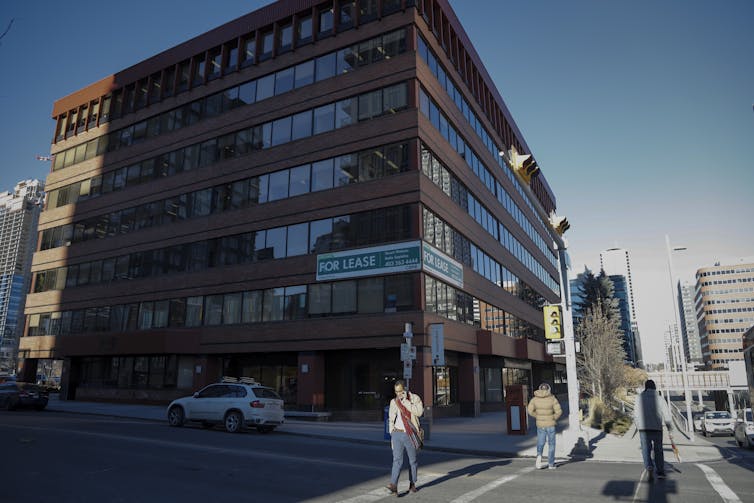
‘Economic citizens’
The Ontario government’s performance-based funding requires universities and colleges to set and report on goals. Some provincial funding is affected by their performance.
Agreements
, which means institutions identify narrow goals like feeding the labour market and increasing enrolments.But the goal of growing student enrolment creates an additional challenge to the housing market.
Canada tripled the population of international students between 2009 and 2021. According to UNESCO, the rate of internationally mobile students tripled globally between 2000 to 2019. It’s now just above six million students.
All these factors point to the reality that student housing is a complex problem that requires dynamic solutions.
Students pitch their solutions
In my classes, students participate in active debates about housing and the
.Students pitch solutions to the housing crisis. One group might suggest “Instaglam” solutions (
.”Typically, students review philosopher Martha Nussbaum’s persuasive list of human rights (known as
) to frame housing as a human right.Economics students have suggested an investment scheme: Part of the cost of student housing becomes a tax-free savings plan for their future housing investments in the local community. Nussbaum’s central capabilities lists suggests that people should have opportunities to “hold property.”
Currently, universities may not track international students who graduated to know where they settled and whether they contribute to the local Canadian economy.
The investment idea came to students after exploring the Canada Mortgage and Housing Corporation (CMHC) website. No international students knew about CMHC until they took my course.
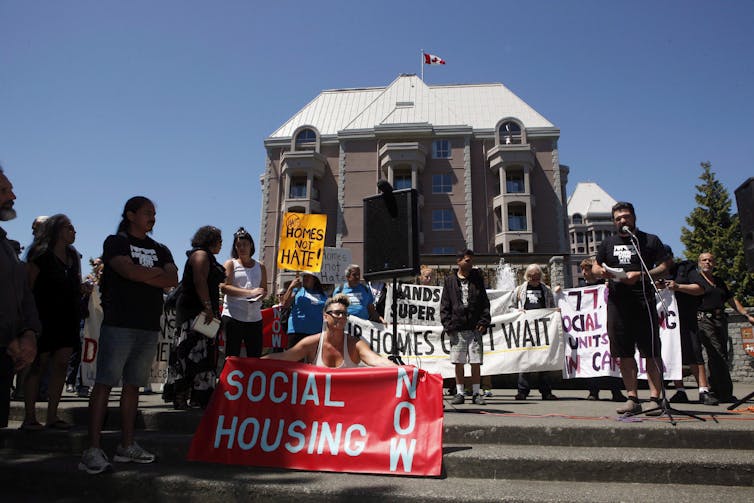
Students also learned from guest speakers about specific issues: Community Land Trusts, where non-profit corporations take a human rights-based approach to housing by purchasing land or facilitating donations to create housing that serves the community; “housing first” approaches for people experiencing homelessness who also need support with addictions; and the complexity of developing interconnected international, national, provincial and municipal government policy.
Precarious work, gig economy
Alex Usher at Higher Education Strategy Associates estimates that by 2025, universities and colleges will take in more than 50 per cent of tuition fees from international student enrolments. The Canadian and Ontario governments hope to generate new revenue while bringing in highly qualified students to prepare for a modern labour market.
The housing crisis demonstrates that focusing higher education planning on unpredictable labour markets and precarious work in a gig economy is narrow and misconceived.
Statistics Canada reported that in the 2019-20 academic year, there were 2.2 million students in public colleges and universities in Canada.
Canada’s current immigration plan will add nearly 1.5 million immigrants by the year 2025, and many immigrants will land in cities with universities and colleges.
Partnerships, support needed
Post-secondary institutions need to ensure they are connecting their recruitment strategies with local housing market data.
Hints of this are happening — such as at the University of Prince Edward Island, where housing precarity was circumvented by asking students to stay home for an additional semester. But there is much work to do.
Institutions should be educating campus advisers about housing advocacy for students and cultural training for their communities, for neighbours, landlords and community professionals. Advisers need to identify solutions for students who know nothing about leases, bus routes, neighbourhood safety and negotiation with landlords and roommates.
On-campus solutions
Institutions need adaptive on-campus housing solutions for the most vulnerable populations. They need to do this rather than seeking to profit from student rents or mandated meal plans as a result of post-secondary underfunding.
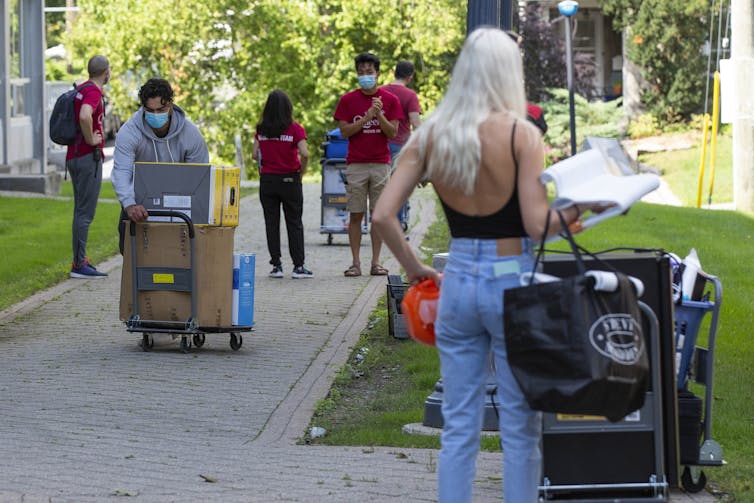
When students opt out of residence because it’s too expensive, they live with little to no support from post-secondary institutions in homes that are relatively unregulated for student living.
Offering housing as a human right means providing shelter where students are safe from mould, fire hazards and maintenance issues. Students should have freedom of movement and be safe from assault, harrassment or human trafficking.
Student housing should connect to economic opportunities rather than a future of crippling debt. Housing should be culturally supportive to provide students opportunities to be among colleagues, mentors and friends as they wade through critically important developmental opportunities to become engaged citizens.
Accessibility, affordability
Student housing needs to be more accessible and more affordable.
Whether the solutions are dormitories, partnerships with private investors with specifically designed regulations and inspections, government-run housing or a combination of these strategies, student housing needs more policy and more planning.
We need specific policies and regulations for student rentals that are based on housing as a human right.![]()
Timothy A. Brunet, Sessional Instructor Economics, University of Windsor
This article is republished from The Conversation under a Creative Commons license. Read the original article.

